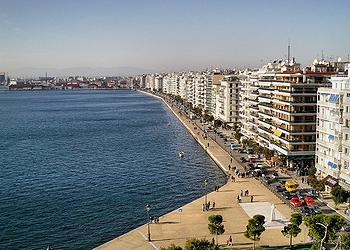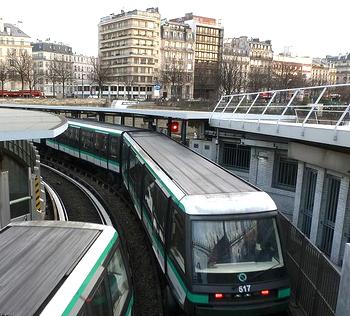
WASHINGTON, DC, February 26, 2015 (ENS) – The World Bank Group, with financial support from The Rockefeller Foundation, is expanding its program to help cities unlock capital to build the infrastructure that supports a climate-smart urban future.
The Rockefeller Foundation has provided a grant of US$1 million as seed funding for a new multi-donor trust fund to improve financial management and enhance creditworthiness of cities in developing countries through the World Bank’s City Creditworthiness Initiative.

The grant will enable collaboration to bring the City Creditworthiness Initiative to five cities over three years.
The five selected cities will include cities chosen to be part of the network for 100 Resilient Cities. Pioneered by The Rockefeller Foundation, 100 Resilient Cities is a new organization that will help cities cope with and recover from 21st century shocks and stresses.
The Rockefeller Foundation observes that the world is rapidly urbanizing, estimating that by 2050, 75 percent of the world’s population will live in cities.
“In the face of urbanization, globalization and climate change, creating infrastructure that builds resilience in cities is more critical than ever,” said Saadia Madsbjerg, managing director at The Rockefeller Foundation.
“For nearly a decade,” she said, “The Rockefeller Foundation has been working with cities to strengthen access to financing options to get these projects off the ground.”
The Rockefeller Foundation began resilience planning with the first group of 32 cities in December of 2013. In 2014, the Foundation received 330 applications from 94 countries for the second cohort.
For example, Paris, France is one of the 100 Resilient Cities. Paris is working to build its resilience as gentrification and urban expansion have segregated communities and put pressure on public transportation systems.

To address the effects of this expansion on both diversity and pollution levels, officials have begun developing public housing within city limits to increase the number of moderate-income households.
The city has also made a push to rebalance the urban landscape in favor of more environmentally-friendly transportation, such as bikes, public transit, and hybrid and electric vehicles.
100 Resilient Cities defines resilience as, “the capacity of individuals, communities, institutions, businesses, and systems within a city to survive, adapt, and grow, no matter what kinds of chronic stresses and acute shocks they experience.”
Shocks are considered single event disasters, such as fires, earthquakes, and floods.
Stresses are factors that pressure a city on an ongoing basis, such as chronic food and water shortages, an overtaxed transportation system, endemic violence or high unemployment.
Resilience planning is about making a city better, in both good times and bad, for the benefit of all its citizens, particularly the poor and vulnerable,” 100 Resilient Cities says on its website.
Among the 100 Resilient Cities are many U.S. cities, large and small: Berkeley, Boston, Boulder, Chicago, Dallas, El Paso, Houston, Jacksonville, Los Angeles, New York, San Francisco, San Juan, St. Louis and Tulsa.

The demand for urban infrastructure is enormous and growing quickly. The Rockefeller Foundation estimates that the global investment shortfall in infrastructure is at least $1 trillion per year.
Cities will require better access to capital markets and large-scale project finance to pursue a low-carbon growth path.
Today, just four percent of the 500 largest cities in developing countries have globally recognized credit ratings, and only 20 percent have credit ratings in local markets, limiting their access to private capital.
The World Bank’s City Creditworthiness Initiative aims to address this challenge by helping cities improve financial management and creditworthiness through training workshops, follow-up support for action planning, technical assistance for adaptation or mitigation projects, and fundraising.
“Achieving creditworthiness is a long journey, but all cities can benefit while they pursue this path by improving fundamentals,” said Marisela Montoliu Munoz, director for urban and disaster risk management, World Bank Group Social, Urban, Rural and Resilience Global Practice.

“The support provided by The Rockefeller Foundation will enable us to help more cities achieve sustainable and inclusive growth in the long term, working with a broad range of partners focused on the cities and climate change agenda,” she said.
The City Creditworthiness Initiative was developed as part of a World Bank Group program that aims to enable 80 cities from 23 countries to strengthen climate action and avoid the prospects of a world warmer by four degrees than it was in pre-industrial times.
Four creditworthiness training workshops have been conducted since October 2013 in Nairobi, Kenya; Seoul, South Korea; Arusha, Tanzania and Bogota, Colombia.
For the near future, workshops are planned in Kigali, Rwanda; Kampala, Uganda and Amman, Jordan.
An advisory committee is selecting the five new cities to receive support. The committee is made up of representatives from The Rockefeller Foundation, 100 Resilient Cities, the World Bank, the Asian Cities Climate Change Resilience Network Initiative, and the Public-Private Infrastructure Advisory Facility’s Sub-National Technical Assistance Program.
The scope of work for each city will be developed in collaboration with municipal and government officials. All partners will review the action plans and join in the design and implementation of the technical assistance programs.
Copyright Environment News Service (ENS) 2015. All rights reserved.
